War Is Peace: Andrew Carnegie’s “Temple of Peace” in the Hague, The Bilderberg Group, The Earth Charter …
World wars, and climate crisis scaremongering as leverage to further the construction of a “peaceful global order”

All Global Research articles can be read in 51 languages by activating the Translate Website button below the author’s name (only available in desktop version).
To receive Global Research’s Daily Newsletter (selected articles), click here.
Click the share button above to email/forward this article to your friends and colleagues. Follow us on Instagram and Twitter and subscribe to our Telegram Channel. Feel free to repost and share widely Global Research articles.
Spread the Truth, Refer a Friend to Global Research
***
A couple of weeks ago, I attended as a speaker (together with astrophysicist Willie Soon and geologist Gregory Wrightstone) at Clintels five year anniversary conferencein the Netherlands. It was a very well organised event with around 140 guests. I contributed with a talk called “The Climate Emergency Illusionists”.
It also gave me the opportunity for some meetings and interviews as well as visiting some well-known Dutch landmarks. One of these was the Peace Palace in the Hague.
Image: Andrew Carnegie (1835-1919)
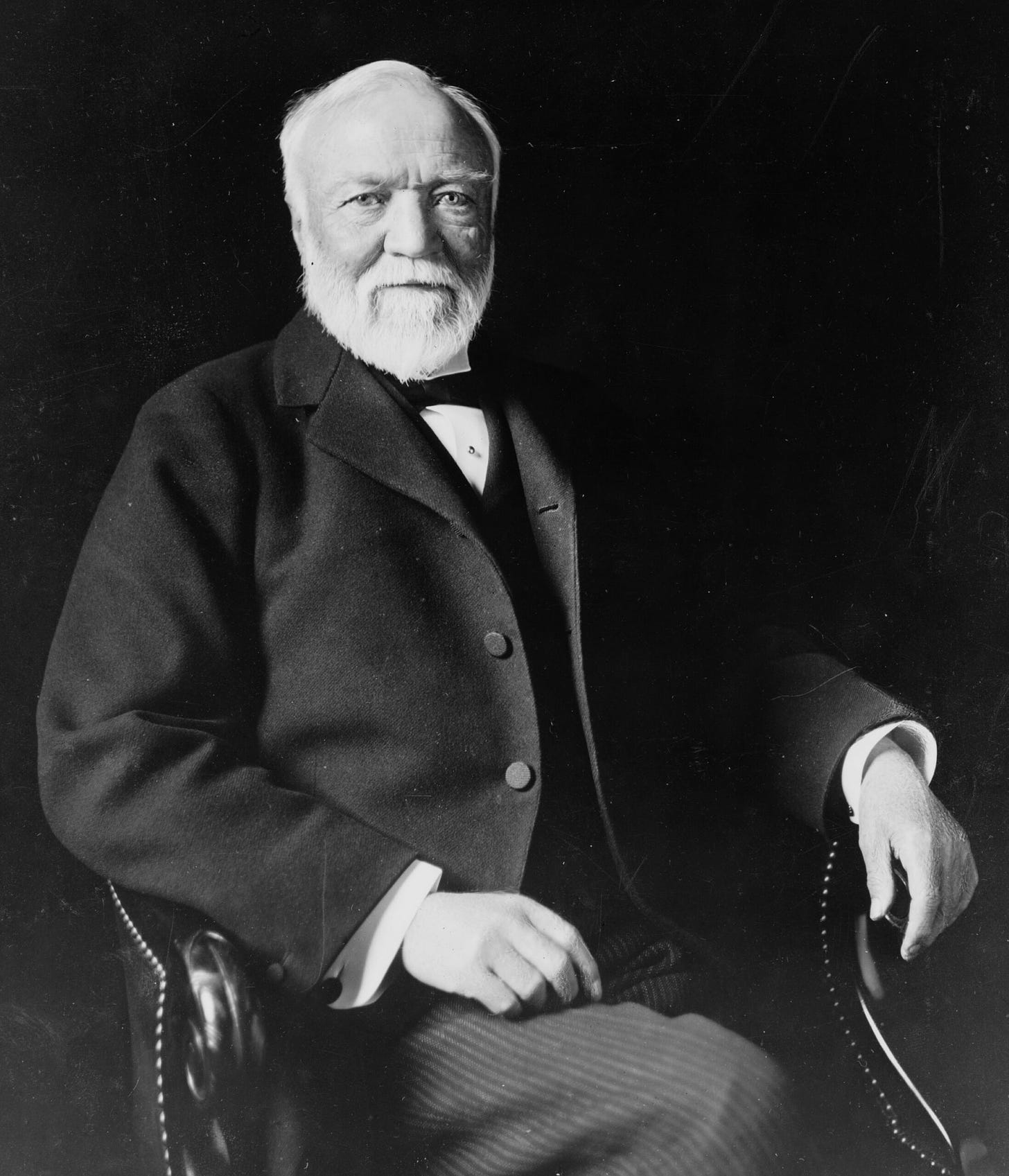
The beautiful building was inaugurated in 1913, with financing from the wealthy Scottish steel magnate Andrew Carnegie with the intention to serve as a “Temple of Peace”.
It now hosts the International Court of Justice (established 1945 as one of United Nations six main organs), the Permanent Court of Arbitration (founded 1899) and The Hague Academy of International Law (established 1923).
The decision to build the palace was made at the “First Hague Peace Conference” in 1899, initiated by Russian Tsar Nicholas II. The conference wasn’t a great success as Russia’s war with Japan broke out five years later, resulting in a humiliating defeat for Russia, while the Tsar was executed by the Bolsheviks in 1918.
Andrew Carnegie supported the construction of the “Temple” with a 5 million dollar donation in 1903. He also lent his name to the Carnegie Foundation in the Netherlands that was set up with the purpose to own and manage the Peace Palace.
Today the foundation receives financial grants from the Dutch Ministry of Foreign Affairs, as well as the Carnegie Corporation of New York. It is a joint venture by Carnegie and the state of the Netherlands.
Just a year after the inauguration ceremony, the Great War broke out. The president of the Carnegie Endowment for International Peace, Nobel Peace laureate and former US Secretary of War, Elihu Root, advocated for American entry into the war.
In other words, the great ideal of universal peace had a price that counted in millions of lives.
The Peace Palace was a part of Carnegie’s internationalist aspirations, and the march towards a global governance system. A goal shared by the Dutch royals. The first step was The League of Nations in 1920, followed by the successor United Nations in 1945. The two world wars acted as a catalyst for a new international order.
The Peace Palace has ever since been an important venue to further the internationalists goals for the world.
Bilderberg Group
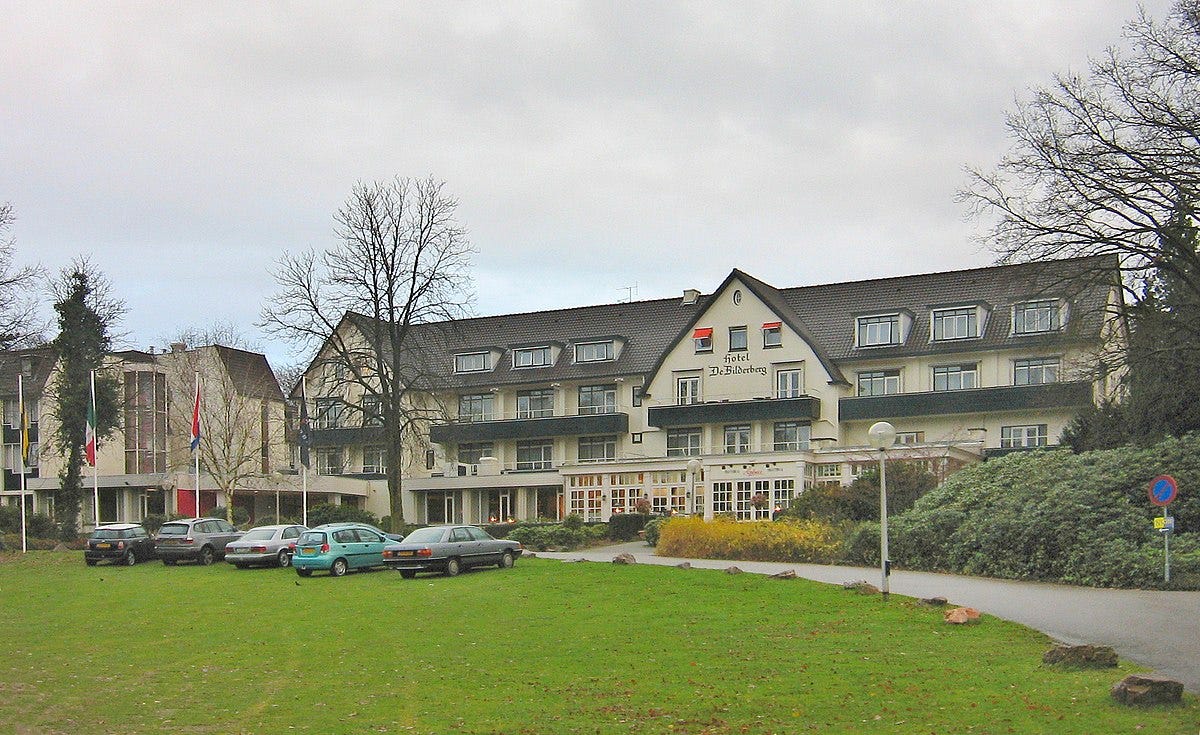
Hotel Bilderberg, in Oosterbeek, the Netherlands.
These aspirations are also reflected in the Bilderberg Group, which was founded in 1954 to gather prominent movers and shakers to influence the future direction of world events, as well as inviting politicians to carry out the agenda in their respective countries.[1] Prince Bernhard of the Netherlands was one of the co-founders, together with David Rockefeller (Chase Manhattan Bank) and Polish politician Józef Retinger, and served as chairman until the Lockheed bribe scandal in 1976 forced him to step down.
Earth Charter
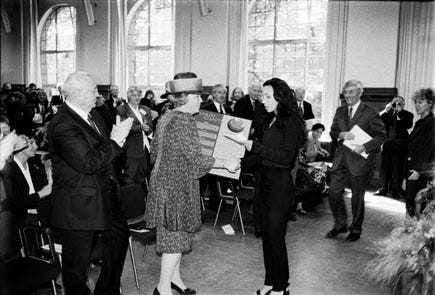
Earth Charter Launch Ceremony. Peace Palace, The Hague. June 2000
On June 29, 2000, the Earth Charter was launched at a ceremony in the Peace Palace. The Earth Charter Commission had been initiated by Bernhards daughter, Queen Beatrix, and her Prime Minister Ruud Lubbers (with oil executive Maurice Strong and former Soviet Union leader Mikhail Gorbachev as co-chairs) with the mission to create an ethical framework for the planet. The Dutch government provided financial support to the project. Steven Rockefeller, chairman of the Rockefeller Brothers Fundand David Rockefellers nephew, served as the commission’s coordinator.
The sixteen principles share similarities with the UN 2030 Agenda with its seventeen Sustainable Development Goals.
The Albright-Gambari Commission
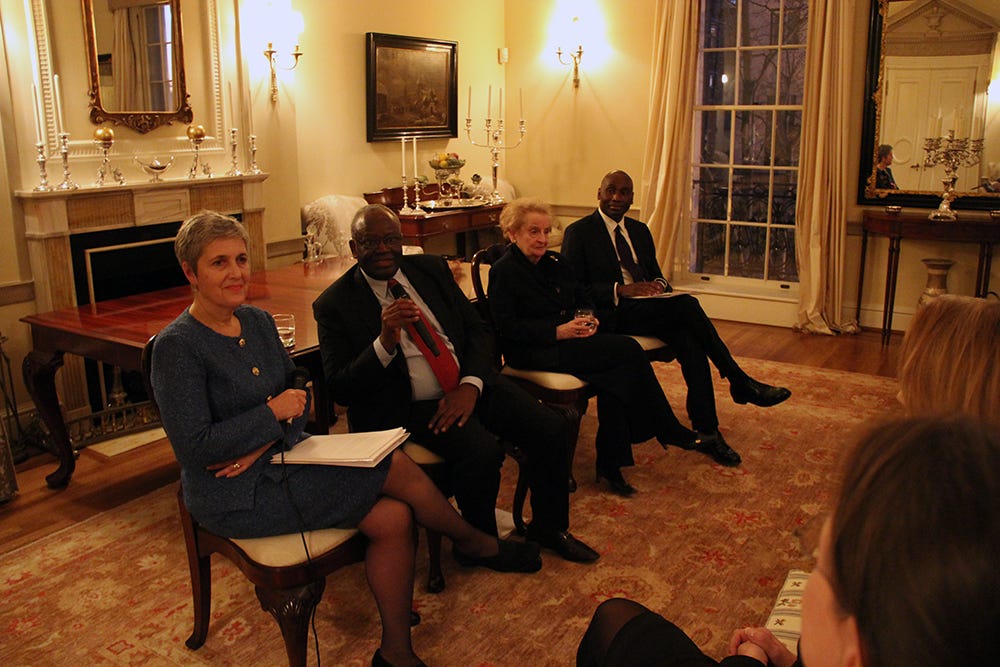
The launch of the Commission on Global Security, Justice & Governance, at the residence of the Dutch ambassador in Washington D.C. 21 November 2014.
Fourteen years later “The Albright-Gambari Commission on Global Security, Justice & Governance” was set up by the Hague Institute of Global Justice (supported by the Dutch government) and Stimson Institute (supported by Carnegie Corporation, and US Department of Defense).
They launched their report Confronting the Crisis of Global Governance, at the Peace Palace in The Hague on 16 June 2016. The intent was to promote global governance innovations and, “to encourage a broad-based global policy dialogue and an institutional reform agenda aimed at 2020”.
These new governance innovations would be presented at a proposed “World Conference on Global Institutions” during United Nations seventy-fifth anniversary in 2020.
New Shape Prize and Bahá’í Faith
The Swedish Global Challenges Foundation heeded the call and launched the New Shape Prize competition in November 2016.
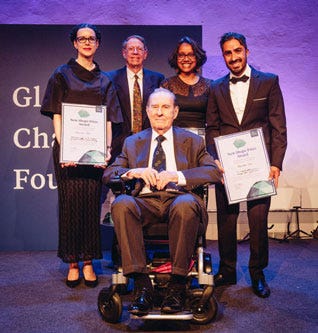
The winners of the New Shape Prize with Laszlo Szombatfalvy from Global Challenges Foundation
One of the winning contributions were “Global Governance and the Emergence of Global Institutions for the 21st Century”, by Maja Groff, a teacher at the Hague Academy of International Law in the Peace Palace, Professor Arthur Dahl from the International Environment Forum and Augusto Lopez-Claros, a former chief economist at the World Economic Forum and the World Bank Group.
The three of them are Bahá’ís. Believers of a religion that preaches the unification of the world under a world government. This will according to their teachings bring universal peace and harmony. As expressed in “The World Order of Bahá’u’lláh” from 1936:
A world executive, backed by an international Force, will carry out the decisions arrived at, and apply the laws enacted by, this world legislature, and will safeguard the organic unity of the whole commonwealth. A world tribunal will adjudicate and deliver its compulsory and final verdict in all and any disputes that may arise between the various elements constituting this universal system. — The World Order of Bahá’u’lláh, The Unfoldment of World Civilization
These ideas closely align with Carnegie’s visions. The winning trio has since the prize ceremony in 2018 been awarded key positions to develop new governance arrangements.
Climate Governance Commission
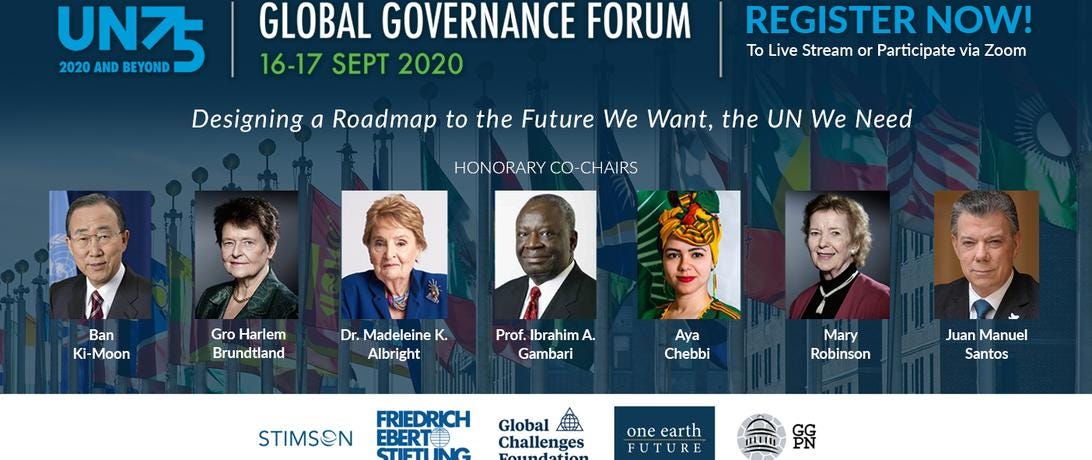
The “World Conference on Global Institutions”, that was arranged as the virtual event United Nations Global Governance Forum in September 2020, birthed the Climate Governance Commission with Groff as convener (with Dahl and Lopez Claros as experts). The COVID-19 pandemic had in their opinion high-lighted the need for closer international cooperation to manage global risks.
The commission (with former Irish president Mary Robinson as chair, and Swedish “climate tsar” Johan Rockström as one of the co-chairs) serve as advisors to the ongoing reform of the United Nations, initiated at the seventy-fifth session of the UN General Assembly (which resulted in the report Our Common Agenda report a year later).
In September 2023, The Climate Governance Commission, funded by Global Challenges Foundation, Stimson Center, Rockefeller Foundation and Baha’i International, proposed the declaration of a Planetary Emergency at the United Nation’s Summit of the Future in September 2024. If their advice is granted, it will trigger the establishment of a Planetary Emergency Platform, and a Planetary Emergency Plan. They advocate collective management of the “Planetary Commons”.
Maja Groff and the New Institute
Maja Groff recently joined The New Institute, a think-tank founded 2020 by German social democrat politician Erck Rickmers and led by the former secretary-general of the Volkswagen Foundation, Wilhelm Krull.
Groff will chair the program Planetary Governance with the mission to “design and implement the needed global governance reforms to address the planetary emergency.” This includes developing a Global Environmental Agency and an International Court of the Environment. We can assume that the location of the latter will be in Carnegie’s “Temple of Peace”.
As with the world wars, the climate crisis scaremongering acts as a leverage to further the construction of their envisioned “peaceful global order”. And as Groffs colleague Arthur Dahl said during a meeting with the Global Governance Forum:
Maybe the best solution to climate change would be a nuclear winter for a few years to cool down the planet very quickly. And maybe, in the longer term, that would be in our best interest than any other solutions tried at the moment.
The Bahá’ís supreme goal of universal peace comes at a high price. To quote George Orwell: “War is Peace”.
*
Note to readers: Please click the share button above. Follow us on Instagram and Twitter and subscribe to our Telegram Channel. Feel free to repost and share widely Global Research articles.
Note
[1] dspace.cuni.cz/bitstream/handle/20.500.11956/172172/140100744.pdf?sequence=1&isAllowed=y
All images in this article are from the author unless otherwise stated

